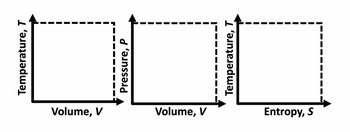
Elements Of Electromagnetics
7th Edition
ISBN: 9780190698614
Author: Sadiku, Matthew N. O.
Publisher: Oxford University Press
expand_more
expand_more
format_list_bulleted
Question
Qualitatively sketch and annotate the Stirling cycle on the following thermodynamic
diagrams. Be sure to indicate where the various steps (A, B, C, D) are taking place on the diagram.

Transcribed Image Text:Temperature, T
Volume, V
Pressure, P
Volume, V
Temperature, T
Entropy, S

Transcribed Image Text:The Stirling engine (invented in 1816 by Robert Stirling) is a heat engine that produces work
through cyclic compression and expansion of a gaseous working fluid, such as hot air. An idealized
cyclic process, aptly named the Stirling Cycle, for such an engine consists of four steps:
(A) isothermal expansion at the hot reservoir temperature, Th,
(B) isochoric (constant volume) heat rejection to a regenerative heat exchanger,
(C) isothermal compression at the cold reservioir temperature Tc, and
(D) isochoric heat absorption from the regenerative heat exchanger back to the initial state.
Expert Solution
This question has been solved!
Explore an expertly crafted, step-by-step solution for a thorough understanding of key concepts.
Step by stepSolved in 2 steps with 1 images

Knowledge Booster
Learn more about
Need a deep-dive on the concept behind this application? Look no further. Learn more about this topic, mechanical-engineering and related others by exploring similar questions and additional content below.Similar questions
- Suppose we have a piece of a candy bar that has an initial mass of 28g. If we ignite the piece of candy bar (literally burn it), and it increases the temperature of 285.23g of water from 18.95°C to 77.43°C, how many calories per gram of energy did the candy bar provide if the final mass of the marshmallow is 4.45? Note: 1.00 cal = 4.184 J. Give your answer in units of cal/g.arrow_forwardFirst law of thermodynamics is based on which concept?arrow_forwardUse the data from this table of thermodynamic properties to calculate the values of AS for each of the reactions at 25 °C. C(s, graphite) + H, O(g) CO(g)+ H,(g) AS = N, (g) + 3 H, (g) - 2 NH,(g) AS = K Question Source. McQuararrow_forward
- Please make sure to provide all the steps expecially for the question D. Thank you!arrow_forwardThermodynamics subject power cycles. Show the ts diagram and complete and step by step solution. Bix the final answer.arrow_forwardAn engine has the Lenoir thermodynamic cycle as shown in the figure. Given: 1 mol of ideal gas CP,m = 3.5 R P1 = 2 atm ; P2 = 5 atm V1 = 3000 cm3 ; V3 = 6000 cm3 Find the following: Temperature at (P1, V1), (P2, V2), and (P2, V1) QH and Qc (Note; QH comes from Process 1->2; Proces 2-3 is considered isentropic efficiency of the enginearrow_forward
- Briefly explain all the Choices and Choose correct ( Draw Diagram if need )arrow_forwarddescribe how the Internal Combustion Engines (ICEs) (applicable to a particular purpose such as generators, vehicle, domestic device etc.) was improved in terms of sustainability in consideration to energy use and pollution effects. 1.Conclusions: Findings based on your current knowledge of thermodynamics should be expressed. Suggestion and implication on possible saving or future projection(s)arrow_forwardThermodynamicsarrow_forward
arrow_back_ios
arrow_forward_ios
Recommended textbooks for you
 Elements Of ElectromagneticsMechanical EngineeringISBN:9780190698614Author:Sadiku, Matthew N. O.Publisher:Oxford University Press
Elements Of ElectromagneticsMechanical EngineeringISBN:9780190698614Author:Sadiku, Matthew N. O.Publisher:Oxford University Press Mechanics of Materials (10th Edition)Mechanical EngineeringISBN:9780134319650Author:Russell C. HibbelerPublisher:PEARSON
Mechanics of Materials (10th Edition)Mechanical EngineeringISBN:9780134319650Author:Russell C. HibbelerPublisher:PEARSON Thermodynamics: An Engineering ApproachMechanical EngineeringISBN:9781259822674Author:Yunus A. Cengel Dr., Michael A. BolesPublisher:McGraw-Hill Education
Thermodynamics: An Engineering ApproachMechanical EngineeringISBN:9781259822674Author:Yunus A. Cengel Dr., Michael A. BolesPublisher:McGraw-Hill Education Control Systems EngineeringMechanical EngineeringISBN:9781118170519Author:Norman S. NisePublisher:WILEY
Control Systems EngineeringMechanical EngineeringISBN:9781118170519Author:Norman S. NisePublisher:WILEY Mechanics of Materials (MindTap Course List)Mechanical EngineeringISBN:9781337093347Author:Barry J. Goodno, James M. GerePublisher:Cengage Learning
Mechanics of Materials (MindTap Course List)Mechanical EngineeringISBN:9781337093347Author:Barry J. Goodno, James M. GerePublisher:Cengage Learning Engineering Mechanics: StaticsMechanical EngineeringISBN:9781118807330Author:James L. Meriam, L. G. Kraige, J. N. BoltonPublisher:WILEY
Engineering Mechanics: StaticsMechanical EngineeringISBN:9781118807330Author:James L. Meriam, L. G. Kraige, J. N. BoltonPublisher:WILEY

Elements Of Electromagnetics
Mechanical Engineering
ISBN:9780190698614
Author:Sadiku, Matthew N. O.
Publisher:Oxford University Press

Mechanics of Materials (10th Edition)
Mechanical Engineering
ISBN:9780134319650
Author:Russell C. Hibbeler
Publisher:PEARSON

Thermodynamics: An Engineering Approach
Mechanical Engineering
ISBN:9781259822674
Author:Yunus A. Cengel Dr., Michael A. Boles
Publisher:McGraw-Hill Education

Control Systems Engineering
Mechanical Engineering
ISBN:9781118170519
Author:Norman S. Nise
Publisher:WILEY

Mechanics of Materials (MindTap Course List)
Mechanical Engineering
ISBN:9781337093347
Author:Barry J. Goodno, James M. Gere
Publisher:Cengage Learning

Engineering Mechanics: Statics
Mechanical Engineering
ISBN:9781118807330
Author:James L. Meriam, L. G. Kraige, J. N. Bolton
Publisher:WILEY